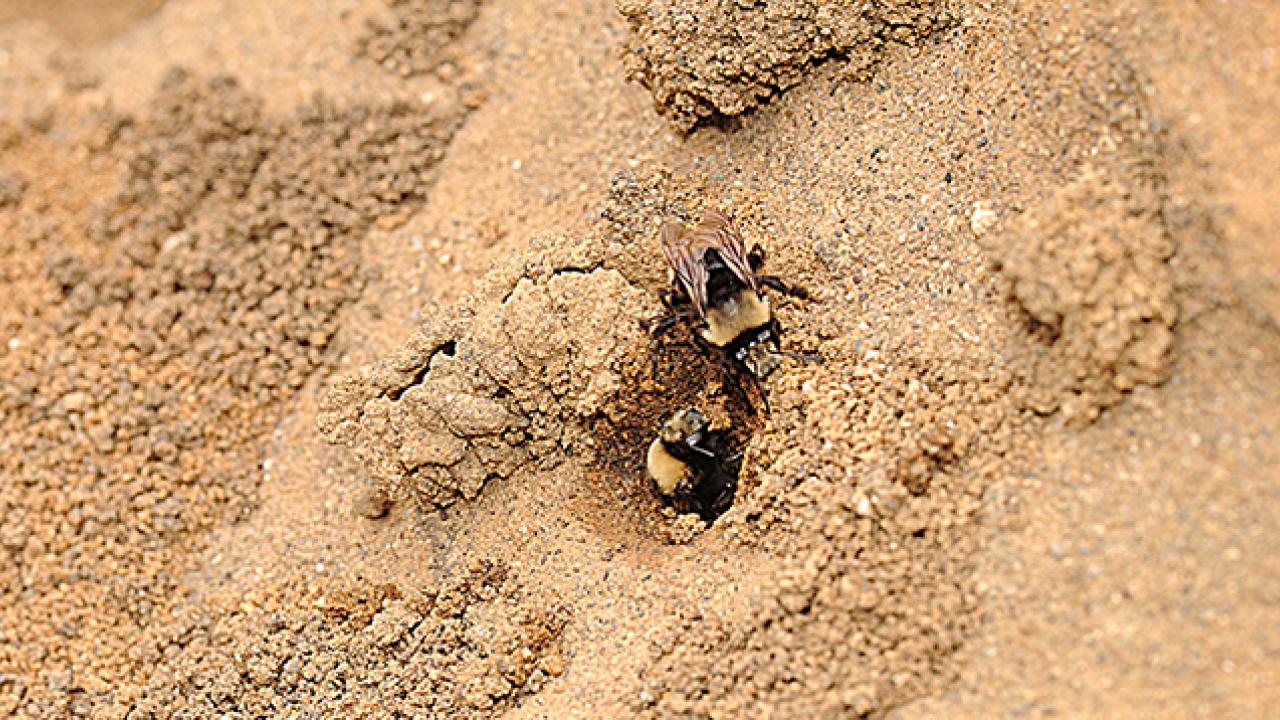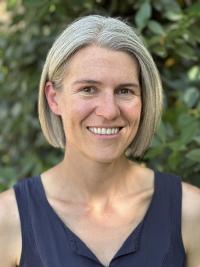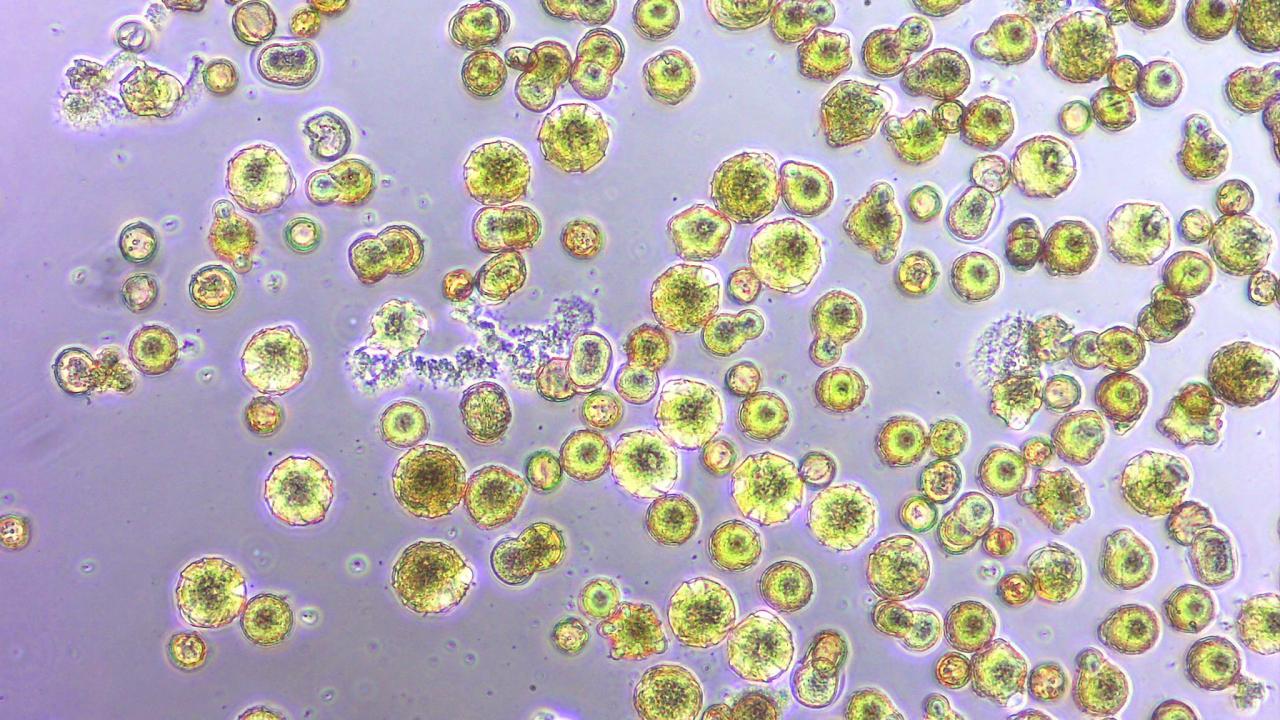
Shawn Christensen: Recipient of Merton Love Ecology and Dissertation Award
He's a member of the Microbiology Graduate Group and the Rachel Vannette Lab

UC Davis doctoral candidate Shawn Christensen, who studies ecology and evolution through a microbial lens in the laboratory of community ecologist Rachel Vannette, is the 2024 recipient of the Merton Love Ecology and Dissertation Award, an annual award that celebrates the university’s most outstanding doctoral dissertation in the fields of ecology and evolutionary biology.
“Shawn’s thesis work spans microbiology, ecology and evolutionary biology, combined with careful natural history, to document novel species interactions between hosts and microbial communities,” said Vannette, associate professor and vice chair of the UC Davis Department of Entomology and Nematology who nominated him for the award. “Each chapter has broad implications for the ecology and evolution of host-microbe interactions. Shawn’s work has already reframed the conditions under insect-microbe interactions are thought to hold relevance and evolve. His research has highlighted the utility of natural history observations of microbes and sampling understudied life history stages (overwintering developing insects).”
“Overall, Shawn’s dissertation is an example of how detailed observations combined with fearless experimental dissection of interesting phenotypes can yield novel descriptions of species interactions that change the field’s perception of when and where microbial communities are important,” she said.
Christensen, a member of the Microbiology Graduate Group, will deliver the Merton Love seminar, his exit seminar, on “Microbial Metamorphosis: How Microbes Influence Pollen and Pollinator Development” from 3 to 4:30 p.m., Friday, May 24 in Room 1230 of Walker Hall. The Zoom link:
https://ucdavis.zoom.us/j/99429777483.
The award memorializes Robert Merton Love (1909-1994), emeritus professor of agronomy and range science, who served on the UC Davis faculty from 1940-1976.
Christensen, who anticipates receiving his doctorate in June, received accolades and widespread media coverage for the first chapter of his dissertation, “Nectar Bacteria Stimulate Pollen Germination and Bursting to Enhance Microbial Fitness,” published in July 2021 in Current Biology. His second thesis chapter on the microbes associated with Anthophora bomboides, has just been accepted for publication by the International Society of Microbial Ecology (ISME).

“Shawn’s first chapter describes adaptations of a flower specialist bacteria to acquiring resources from pollen—a nutrient source specific to flowers,” Vannette said. “Our lab was interested in the ecology of the flower-dwelling bacteria Acinetobacter, but Shawn took a new look at this bacterium, examining its growth morphology in nectar and in association with pollen. He noticed that this bacterium co-localized with pollen and grew exponentially more in the presence of pollen. To explore this phenotype, he designed new media and assays (microwaving pollen) to determine that Acinetobacter benefits the most from live pollen via stimulating pollen to germinate (within minutes!), then digesting it. Shawn then designed a series of experiments to examine if this ability was unique to this bacterial clade or shared among many floral microbes (it seems to be specific to Acinetobacter).”
Christensen related in the awards packet that “Within ecology and evolution, I study the unseen and unexpected impacts of microbes. I specifically chose to study ecology and evolution through this microbial lens, as microbes are ubiquitous, evolve quickly, and are commonly facilitators of evolutionary ‘leaps’ for macroscopic species. For example, many herbivores use cellulose degrading bacteria for digestion, and plants acquired and transformed free-living cyanobacteria into chloroplasts.”
In noting that evolutionary biologist and geneticist Theodosius Dobzhansky (1900-1975) wrote an essay titled “Nothing in Biology Makes Sense Except in the Light of Evolution,” Christensen commented he would add “many things in ecology make more sense in the light of microbiology.”

“I specifically study the impacts of microbes within the plant-pollinator system and have focused on specific interactions and attributes during each of my dissertation chapters,” Christensen said. “Through use of classical natural history observations combined with entirely novel experimental and sampling approaches, I have been able to discover unique phenomena in microbial ecology that not only have important implications for pollinator systems but have changed broader perception and understanding of ecology and evolution.”
His first chapter “explored and defined a unique strategy of pollen nutrient acquisition by a nectar and bee-associated bacteria.”
This Bacteria Induces Pollen Germination
“Pollen is nutrient rich but heavily protected by a strong outer shell, making it hard to digest,” he explained. “Using microscopy, image analysis, growth assays, and protein quantification, I found that this bacteria was able to induce pollen germination and bursting in order to access pollen nutrients, and this ability increases its growth and fitness. This is the first and only demonstration of non-plant induction of pollen germination. I showed that the bacteria is essentially ‘hacking’ pollen biology for their own benefit.”
The chapter broadened the scope of potential microbial roles for pollinators, he said, and showed that the “viability of the pollen may impact its digestibility, as dead pollen could not be induced to germinate and did not release nitrogen--which has clear implications for pollinators using this microbial ‘hacking’ strategy. Broadly, this chapter supports the idea that microbial specialization in resource use underlies habitat specialization and uncovered unexpected types of microbially mediated interactions between plants and pollinators.”
In Christensen’s last two chapters, he investigated the microbial communities of the solitary bee, Anthophora bomboides, a digger bee-bumble bee mimic which nests in the sand cliffs of Bodega Bay and Point Reyes.
“He collected brood cells (nectar and pollen balls along with developing larvae) from these locations at multiple points through bee development and examined not only the bacteria and fungal community composition through insect development, but also examined changes in microbial abundance at each life stage,” Vannette said. “In contrast to my (and the literature’s) predictions, Shawn showed that microbial abundance peaks during larval overwintering, when solitary bees and other holometabolous insects are predicted to have voided their microbial gut communities. Instead, healthy A. bomboides hosts the highest abundance of fungi and bacteria during the fall—a wet season where pathogen abundance is also highest.”
Bee Hosts a Unique Fungus
Christensen isolated Streptomyces bacterial strains from these brood cells and showed that they effectively inhibit the growth of three different fungal pathogens of bees. “The bee also hosts a unique fungus: a yeast strain that persists with this bee throughout its life cycle,” Vannette pointed out. “Not only is this a novel finding in solitary bees—it was thought that only social bees were able to maintain consistent symbioses—but the fungus is also associated with changes in bee sugar alcohols which may mediate cold tolerance and overwintering success.”
“Shawn is only gaining momentum: he is a co-principal investigator on a newly awarded grant by JGI to sequence the genome of the yeast and explore its functional potential in renewable energy and is applying to continue to leverage this system’s potential in antifungal chemistry and evolution of pathogen defense.”
Christensen, an evolutionary biologist turned microbiologist, received his bachelor of science degree in evolutionary biology from the University of Wisconsin-Madison. Active in the Entomological Society of America (ESA), he won the President’s Prize in his graduate student category for his presentation, “Bee Specific! Solitary Bee (Anthophora bomboides) Hosts a Specialized Core Microbiome through Development," at ESA’s 2023 meeting in National Harbor, Md.
His research on Symbiotic Bacteria and Fungi Proliferate during Diapause and May Enhance Overwintering Survival in a Solitary Bee,” appears in the November 2023 edition of BioRxiv, pre-print server for biology.
Christensen is the second recipient from the Department of Entomology and Nematology to receive the award since 2012. That year Ian Pearse of the Richard Karban lab won the award. (See news story)
